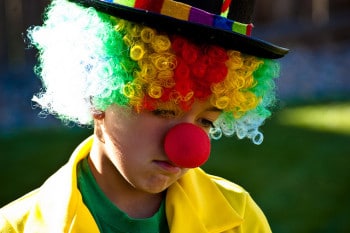How to deal with knock backs: Rachel Cole with Chloe Dallimore
Welcome to Stage Door Shrink, a regular column aimed at helping performers chortle their way to a #win.

For each column, I’ll enlist the help of an industry professional to think through some lifestyle issues for performers and provide some practical insights so you can be that person everyone hates (because you’re so high functioning and fabulous, not because you’re a wench). This week we’re discussing:
“How to Deal with Knock-Backs”
Almost every performer is an expert on being knocked back, it’s the nature of the beast. Think about it: you are much more likely to be cut from the audition room than given the job. Disney reported that for Mary Poppins they received around 2000 submissions, auditioned 600 people and cast 34 adults. Statistically, each performer had a 1.7% chance of booking the gig. Cut to me sobbing in the alley way next to Opera Australia for 20 minutes after being cut. In fact, the night I met my boyfriend I was drowning my knock-back blues (KBB) in a $4.95 Pepperoni pizza and a cleanskin. That’s my post audition ritual (whether I book it or get cut, it’s win win. For Dominos. And AA.)
The truth is, rejection is painful. This is particularly true when there are very few auditions going around, or you felt you were perfect for the part, or you are on ‘strong hold’, then the part goes to a 16 year old from The Voice.
There are great ways and terrible ways to deal with knock-backs. St Ignatius says you should allow yourself a brief time to wallow. I.e. 15-20 min to shake your fist at the sky, cry in the alley, have a couple of cheap drinks.
(Okay, St Ignatius didn’t say that)
BUT, let your grief have a finite time period. After that, remind yourself that regret, failure, embarrassment and insecurity are dead emotions. They do not change what happened, they only make you fat on pepperoni pizzas. The key is turning negative emotions around to be useful feelings. This way regret becomes resolve: not to make the same mistakes. Rejection becomes realism: that you are not right for every part. Laziness becomes discipline: to prepare earlier and better. Taking this tack allows you to constantly improve after a knock-back rather than stagnate; to learn from rejection rather than spiral into depression and quitting. Bear in mind that those who are ‘successful’ or working performers are often those who can cope with knock-backs the best, and therefore stay in the game longest.
According to Chloe Dallimore

I met up with the lovely Chloe Dallimore to discuss this topic with someone more experienced, successful and leggy than myself. In her 20s, Chloe went from show to show without a break, always covering or dance captaining until she was 28 at which time she booked Ulla in The Producers.
After becoming a Principal, she tells me, you are suddenly suitable for less gigs as your cast-ability becomes more specific.
When The Producers closed she faced a long period where nothing was suitable, and for the first time in her career had to deal with down time and rejection. Instead of getting down about the dry spell, this led her to be more philosophical about casting processes. She may just be too tall, too blonde or too skinny (that’s normally what casting directors normally tell me when I get cut: far too skinny…).
Something fascinating about Chloe is that she has also sat on the other side of the table, as a creative. This insight into the casting process taught her valuable lessons in regards to dealing with knock-backs.
Chloe’s Top Tips for dealing with knock-backs
Check yo’self
Make sure your ego/confidence balance is in check. This sort of work is all done behind the scenes. Your mental state before you enter the room will determine how you cope with what happens in the room. Whilst confidence is vital for the audition process and our careers, if your ego is so big that you can’t cope with a knock-back, or notes, or corrections you’re going to be in trouble quickly and struggle to grow as a performer. She tells me a proverb she learnt from her Granddad, “Everyone is your teacher”. This not only gives you positive role models and also helps you learn from someone else’s mistakes without having to make them for yourself. For Chloe this means that the ego/confidence balance is always in check if you believe you can learn from everyone. Find that self belief without being cocky.
Set Goals
Give yourself a goal for each audition. Work out what is hard for you in the audition requirements, i.e. a belt note, an accent, breathing, an acting choice etc, and focus on that in the room. This means you can take that skill away with you to the next audition or gig, (even if unsuccessful in the audition), it also helps take your focus off the nerves and onto that one aspect. Every gig or audition feeds into your knowledge pool. Whether or not you get the gig is not in your control- whether you can belt that note is. Be proud of that achievement.
Plan a Distraction
Have a distraction ready the night after the audition. That way even if you’re knocked-back, you can catch up with some friends, get some perspective, realise that no lives were at stake. You weren’t performing brain surgery, you just cracked while belting a D. This links in to the earlier advice of giving your wallowing period a finite amount of time. We can spend weeks leading up to an audition trying to work out what to wear, or what to sing, and weeks after wondering ‘what if’. ‘What if’ thoughts are never fruitful as they don’t change the past or influence the future. This is a skill which Chloe took time to learn.
It’s not you, it’s them
Understand that it’s almost never personal. As opposed to breakups, it’s not you, it’s them. Consider the inferences you have drawn about yourself after the audition. ‘Attribution’ is a Psych term which refers to the inferences we make about events and behaviours. External attributors are people more likely to ‘blame’ events on things outside themselves, while internal attributors blame themselves. What Chloe has learned from being on the creative side is to externally attribute. (I didn’t get the part because my shoe is an 8.5 and they need a 5, etc)
This is a healthy way to interpret events. Internal Attribution is an unhealthy and dangerous way to interpret events. People who do so are much more prone to depression and anxiety and think that they didn’t get the job because they’re to short, fat and hairy. Don’t get me wrong, there is a time for personal reflection: did you do the best you could, were you prepared, did you shave etc? Ask yourself what you could have done differently, but acknowledge that sometimes there is no answer.
Remember the magic
Keep up your motivation. Chloe went through a period when she doubted the industry altogether. The audition process is exhausting, rehearsals are long and then when a show gets cancelled early the recovery process is not only financial but emotional and potentially physical. She began to question if she could bounce back from the rejection and lack of control at all.
Her advice is: it can take time.
When you start hating on life, after a few knock-backs, it’s always helpful to remind yourself that you love performing, you love music. Get yourself to a gig, a play or a show and relive the magic of theatre. Consume it and breathe it. Remind yourself that the joy and the magic of live theatre is vital.
It’s all in the attitude
Rejections don’t get easier as you get older. You just get more philosophical about the result. They also don’t get easier unless you address your attitude. Chloe also chooses not to tell many people that she is even attending an audition as she feels like it takes her energy away from where it’s needed, and means she doesn’t have to explain to 20 people why she didn’t get the part.
Also, treat every dance audition as a free dance class. Who doesn’t love saving money?
Also, be as prepared as possible. That way you won’t have to deal with regret as well as rejection.
Allow yourself time to wallow but don’t stay there. Be disappointed but take something away to work on.
Turns out Chloe and St Ignatius are as wise as each other!
Rachel Cole is a Research Psychologist masquerading as a Swing & Nessa Rose Understudy on the Australasian tour of WICKED. She likes to think about what makes people tick. She also likes: Podcasts, politics, pepperoni pizza, property, puns, puppies and cheap things. If you know of a political podcast full of puns we can listen over a cheap pepperoni pizza while we walk a cheap dog looking at cheap property, we might just be fast friends.



